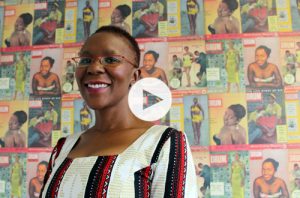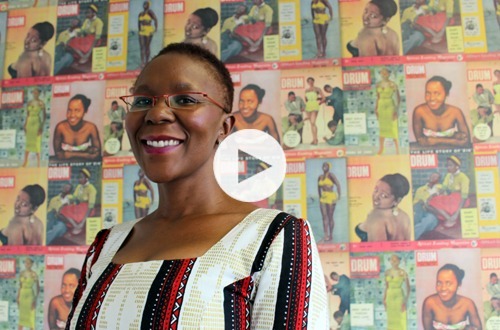
Every month SME South Africa will talk to leading South African business people to discuss their insights on leadership and strategy.
Polo Leteka Radebe is comfortable with going against expectations. Radebe is behind one of the country’s only black women owned and managed investment companies, Identity Partners.
More South Africans will be familiar with Radebe as one of the judges of Dragon’s Den South Africa where she enjoys rapport with entrepreneurs who can appreciate that she understands their challenges and appreciate her clear, calm no-nonsense approach.
Radebe similarly went against the grain with the decision of who she would invest in. Her fund, IDF Managers, which launched in 2008 invests exclusively in women entrepreneurs and has succeeded where many others have failed. Radebe’s organisation made the decision to back black and women owned businesses, considered by many financiers as not commercially viable or “risky”.
To challenge the statistics they have had to get certain things right, Radebe puts it down to the right technical skills, background and credentials.
SME South Africa speaks to Radebe about getting others to buy into your vision, and why if you do not understand your numbers, you actually don’t understand your business.
Q: What was the biggest lessons you learnt from your first failed businesses?
I started running a bed and breakfast (BnB) whilst I was still employed. I was living and working in Pretoria and my business was in Mafikeng which is around 300 kms or so from Pretoria.
A BnB is a lifestyle business, and lifestyle businesses by their nature require a lot of TLC from the owner because they are a lot of the time driven by what you are interested in on a personal level and not so much about the commercial aspects, but of course it has to make money, but you are not so much driven by it.
The first lesson there, therefore, was that you can’t run a lifestyle business when you are 300 kms away from it because lifestyle businesses tend to be very people-centric and customers need to be taken care of. Because when you leave your business in the hands of other people you leave them with rules and instructions. And people tend to try stick to those instructions and those rules and sometimes when a business is faced with challenges it requires flexibility and a lot of the times as the owner and as the visionary behind the business you are the one that can make that call.
“If you do not understand your numbers, you actually don’t understand your business, it is as simple as that”
The second lesson is whilst I am not against having family members in a business per say. I have learnt that it is very important to hire the right people with the right skills; if they happen to be family,that’s great. I had my mother and cousin running it for me – and I felt comfortable leaving it in their hands because they love me and of course they had my best interests at heart, but they didn’t have the vision, so they did the best that they could, but they were not necessarily trained to run a business in the tourism industry.
A very important takeaway is to hire the right people and be willing to pay the right price. A lot of the time as entrepreneurs we focus on getting the cheapest people which can be the least appropriate to get your business to where you want it to go.
THE CONFIDENCE TO ACHIEVE
Polo Leteka Radebe talks about how wanting to be a millionaire as a teen shaped her career path.
I always say the proper definition of what we do is risk management really. We provide risk capital which means that we do have a risk appetite, but it would be foolish to not try mitigate against risk. So we occupy a lot of our time with trying to understand the risk, quantify it and see how we can mitigate against it.
Once you have made the investment you are constantly working to manage and mitigate that risk. That’s what we do.
We don’t shy away from it, that’s why we exist. You have to remember that that’s the problem that we were solving. Part of the problem that we were solving was that typical financiers are actually very risk averse, and yet there is so much appetite for financing amongst entrepreneurs and they are just not unlocking it because the risk profile is deemed to be so high. So what we said is ‘ok well, everyone is running away from this thing, we will go to this thing, understand it, and see how we can work with it, and we have done a decent job of it actually.
Q: The IDF has been around for eight years, what are some of the leadership lessons you have learnt from running a successful enterprise?
I think vision for me – having a clear vision is really important. For yourself and for your team, and effectively communicating that vision and getting buy in from as many people as possible because a leader is not there to do the day to day running around.
I have been very adamant with my team that whoever joins us has to have a vision of their own. So each team member has their own vision so when they look at our organisational vision they can see how the two visions work together. I believe that the people that work here need to see their own vision being realised as they are helping us to realise the vision of the organisation. And it is something that you constantly have to talk about and remind people.
“I have been very adamant with my team that whoever joins us has to have a vision of their own”
I’ve also realised that you often think that when you go through a lengthy business strategy session with your team and you set out your vision and mission that in March, June and August people will still remember. People forget. So creating a platform that allows you to constantly remind people where we are going, where we are and how we are going to get there is really very important because people do get lost along the way, sometimes people get overwhelmed especially in a fast growing business.
Q: How do you achieve this on a practical level?
You have to institutionalise it. You have to be very disciplined about regular team interaction. So in our organisation Mondays are non-touchable days. Most of us if not all of us are on the premises because that is when we have our team meetings. Mondays everyone knows you can’t have external meetings.
Q: How do you make big decisions?
My decision-making has been very unscientific, I think in the past as I was growing as a leader I used to make a lot of my decisions on my own. I am a just do it kind of girl; if I think it’s a good idea even if we haven’t figured everything out yet, I believe let’s just get on with it.
I don’t want to create the impression that I am reckless though, I am not reckless, I do believe in taking the time to research and understand but I don’t believe in getting to a point of perfection before I start. So I try to find a balance between do I know enough to convince others that I have an inkling of what I am talking about, I may not be an expert on it yet, but I should have knowledge to enable me to start something. .
But I think as I have developed and evolved as a leader I have found that it is exceptionally important to involve the team. You hire people not because of the numbers, but you hire people because of what they can bring to the table and you need to fully exploit that. And five brains thinking about one issue always comes out with a better outcome than if it was just one brain. This way it’s also easier to get buy in, you don’t have to sell. Now I am much more consultative, but as a leader sometimes you have to make the call.
LEADING BY EXAMPLE
Part 1: Polo Leteka Radebe talks about how her company is challenging the gender status quo and daring to be different from the rest.
I am an accountant by trade so I am comfortable with numbers, but we should not underestimate how much people are intimidated by numbers. And the reason I am being very careful with my response is because numbers are what tells you whether you are going backwards or forwards or you are standing still. Numbers tell the story at the end of the day.
So it is important that we start changing the mindset and the relationship that people have with numbers. If we stop looking at numbers as debit and credit and start looking at them as ‘what story are they telling’ then we might start winning the war against the intimidation that people feel for money. Because if you do not understand your numbers, you actually don’t understand your business, it is as simple as that.
For me if you ask me how my business is doing, the first thing I’m doing is to look at my charts, then I will tell you that we are doing ok. That’s the kind of relationship that you should have with your numbers. Entrepreneurs should be looking at their management accounts at least monthly. You need to look at how your business is doing on a monthly basis and the numbers are the ones that will tell you that.
Your numbers tell you whether you are pricing right, if you are paying people are they producing what you require at the right quantities, at the right rates at the right price. The numbers are there to help you make these kinds of day to day decisions in order to improve your chances of you succeeding and making a profit in your business.
“The reality is that when you start a business it’s to make money and we need to be unapologetic about it”
Q: What self-limiting beliefs about money have you noticed?
We have been brought up to believe that wanting to be rich is somehow evil, negative, makes you greedy. We need to change that mindset, the reality is that when you start a business it’s to make money and we need to be unapologetic about it. I am not proposing of course that we start to make money by any means and at any cost. You need to be mindful of the environment that you operate in, you need to be mindful of the society that you operate in.
I actually think the businesses that have longevity are the ones responding to social problems. So you can make money while you are doing good, but you need to be unapologetic about the fact that in order to do good you need to make money.
I believe as Africans and as women in particular, we also need to start building institutions that are going to outlast us, that are going to be there for our children and our grandchildren.
LEADING BY EXAMPLE
Part 2: Polo Leteka Radebe talks about why the world needs to seek out and invest in women-owned enterprises and what this would mean for the economy.
Sometimes I just cry, I am very big on crying, some people laugh at me. Women in business we are made to feel that we need to start ‘manning’ up. We can never be men. And we should not aspire to be men, men are fine as they are, and we should also be let alone to be the way that we are. There is absolutely nothing wrong with feelings. So of course I grow through feelings of sorts. But I am a great believer in thinking things through. So I spend a lot of time trying to understand what led to whatever catastrophe – in fact I am very painful about it.
For me until I understand the root of it I can’t even allow myself to start saying ‘these are the solutions.’ I do believe in clearly defining the problem. Just like when you are starting a business – I am a big proponent that business is about solving problems. But you cannot solve a problem if you don’t properly understand it. So similarly with challenges. Even when we lose business, I always go to whoever deprived us of the business and go ‘so what was wrong with our proposal?’ Because that is the only way we will learn, and improve and hopefully have a better chance next time of getting the business.
LEADING BY EXAMPLE
Part 3: Polo Leteka Radebe talks about women taking their place in business and why waiting for permission is not an option.
I always look at what the team make up is. Again I am a vision driven person. For me it’s important that the business’ vision is aligned with ours.
I look at work ethic and culture is very important. We have a particular organisational culture that we have been building over time and that has evolved over time, it is important that the person who comes in will fit into that culture, it is important for the person that comes in to help us fill the gaps.
I like hiring people who say they want to run their own businesses, because we are an entrepreneurial firm and we encourage entrepreneurship internally, so I like entrepreneurs. I accept that it means that the lifespan of my people will not be 10 years, because if they have entrepreneurial visions they are just here to learn the ropes and leave which is fine, so what we do is ask ‘what can we get out of this person?’ during the time that they are here, so let’s maximise and build on that so when they leave that we have fully benefited from them.






